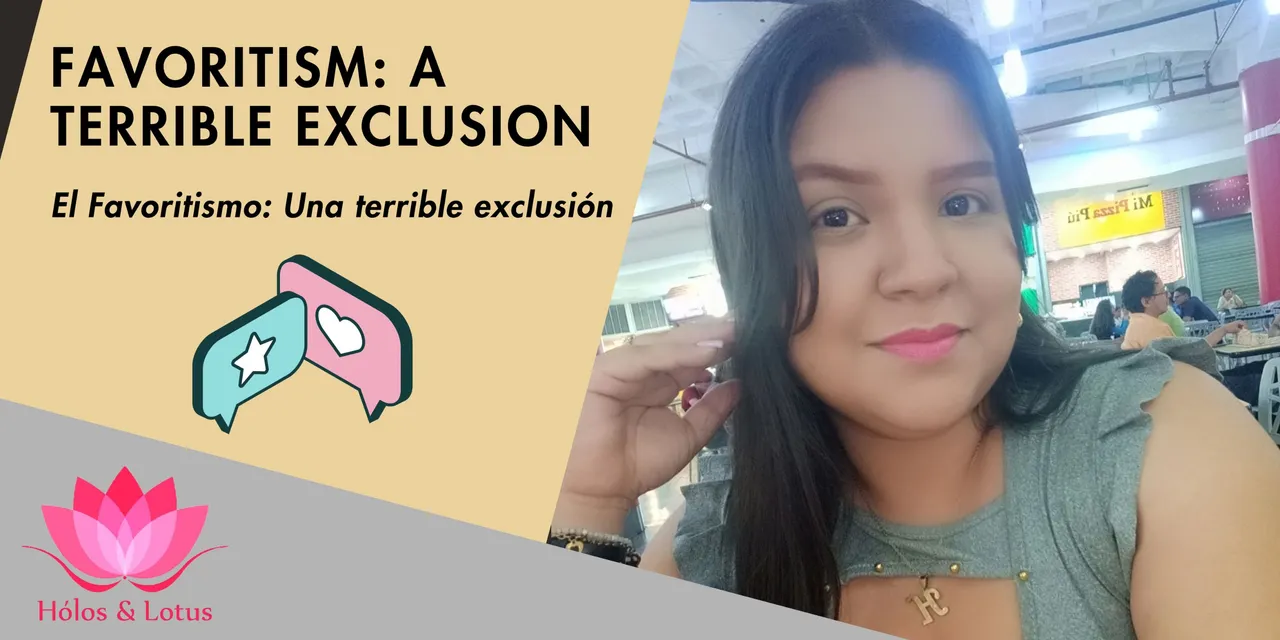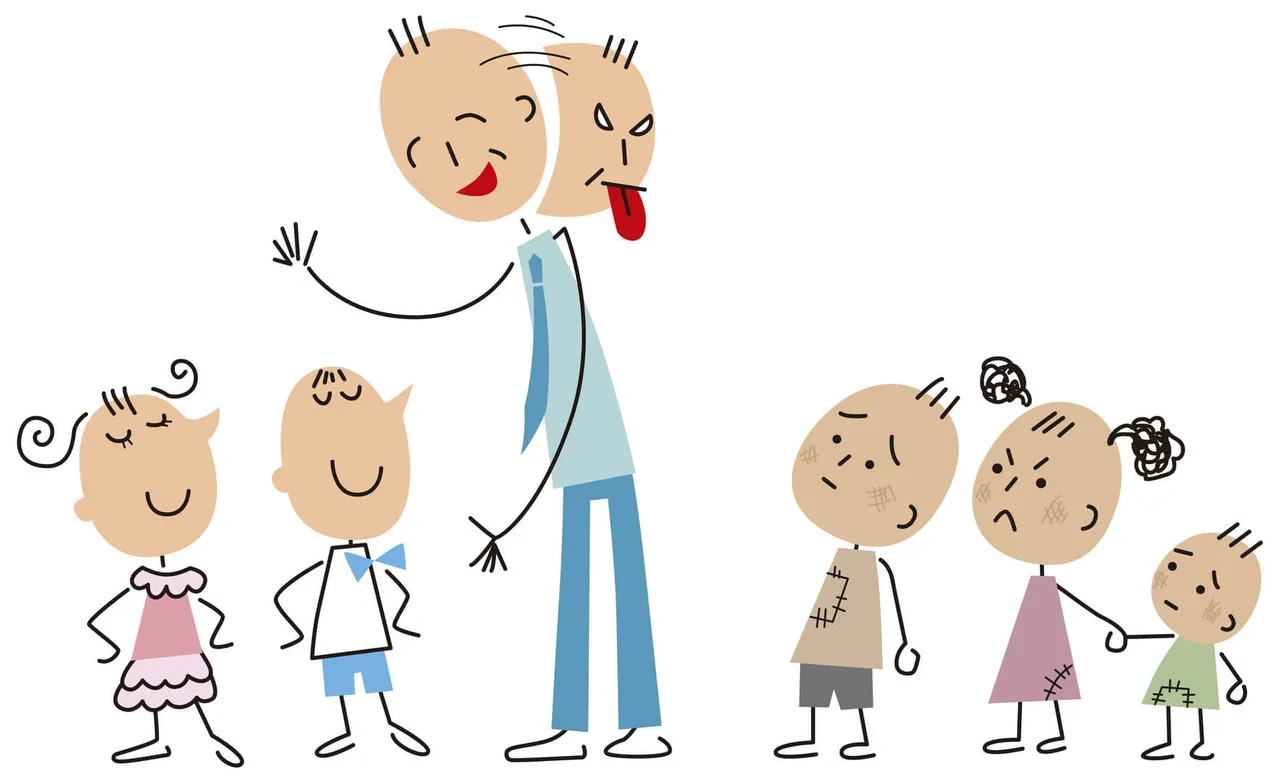Hello dear hive community! 😉
¡Hola querida comunidad de hive! 😉
En algún momento te ha hecho ruido la frase “ para mí mamá o para mí papá nunca hice nada bueno, la preferida era mi hermano (a)”; o fuiste parte del caso contrario y siempre disfrutaste de ser el preferido. Hoy trataremos de entender un poco sobre “ El Favoritismo”.
At some point you have heard the phrase “for my mom or for my dad I never did anything good, the favorite was my brother (a)”; or you were part of the opposite case and always enjoyed being the favorite. Today we will try to understand a little about “Favoritism”.

Imagen realizada con la página web de diseño gráfico y composición de imágenes Canva // Image made with the graphic design and image composition website Canva.

Los hermanos, en secreto, sienten resentimiento por aquellos hijos que son preferidos, pero anhelan serlo y así poder obtener la atención que merecen. Él resultado es que cuando son adultos se presenta una carga de resentimiento, vergüenza y heridas acumuladas.
Si analizamos un poco más el término favoritismo, se puede definir como “preferir a una persona en lugar de otra, o a expensas de otra”. Se expresa concentrando toda la atención especial y complacencia en una o más personas, excluyendo a otras. Generalmente el preferido puede poseer ciertas características como ser atleta, hogareño, el más inteligente, el más agradecido, o el mejor de la familia, incluso el más débil.
Ahora bien, es importante acotar que la raíz del favoritismo no se debe al niño, se trata de los padres, de los adultos:
1- Es un asunto de placer: No es lo que él niño hace o necesita, sino cuán agradado está el padre o la madre con su comportamiento, se refiere a cómo los hace sentir.
2- El adulto usa al niño para llenar un vacío en su vida: Los niños feliz y gustosamente cooperan en llenar la carencia.
3- Si el adulto se le hace difícil desarrollar relaciones adultas, el niño que es dependiente, retribuirá en amor y estará menos presto a dejarlo si lo hiere, con lo cual el adulto se siente satisfecho.
Siblings secretly resent those children who are preferred, but long to be preferred so they can get the attention they deserve. The result is that as adults they are burdened with resentment, shame and accumulated wounds.
If we analyze the term favoritism a little more, it can be defined as “preferring one person over another, or at the expense of another”. It is expressed by concentrating all special attention and complacency on one or more persons to the exclusion of others. Generally, the preferred person may possess certain characteristics such as being athletic, homely, the most intelligent, the most grateful, or the best in the family, even the weakest.
However, it is important to note that the root of favoritism is not due to the child, it is the parents, the adults:
1- It is a matter of pleasure: It is not what the child does or needs, but how pleased the parent is with his or her behavior, it refers to how it makes them feel.
2- The adult uses the child to fill a void in his or her life: Children happily and willingly cooperate in filling the void.
3- If the adult finds it difficult to develop adult relationships, the child, who is dependent, will repay in love and will be less likely to leave the adult if he/she hurts him/her, with which the adult feels satisfied.

Source
Sin embargo, el favoritismo puede generar resultados alarmantes tales como, división matrimonial de manera emocional, una familia devastada, el rechazado desea el mal del favorito y por último una ruptura familiar severa
Pero resulta que cada persona tiene un valor que es personal y que además viene desde la perspectiva de Dios. Cada niño es un diseño único, es decir, ninguna persona es igual a otra, aunque tengan muchas características similares, cada persona es un diseño único, pero el favoritismo ignora el valor que Dios le da a cada persona.
Cada niño, como sea que haya sido concebido, es un diseño único de Dios y merece protección. No fue creado para complacer placeres mezquinos, que destruyen física y emocionalmente la vida que Dios está creando. Necesitamos ver a cada persona desde la perspectiva de Dios.
Aunque varios niños nazcan de los mismos padres, ninguno nace en la misma familia. La dinámica familiar cambia con la llegada de un nuevo niño, el primero recibe toda la atención, el segundo puede que reciba un poco menos de atención y así sucesivamente. Los años hacen que los padres sean más tolerantes; lo que antes era muy impactante luego no lo será.
However, favoritism can generate alarming results such as emotional marital division, a devastated family, the rejected one wishing evil on the favorite, and ultimately a severe family breakdown.
But it turns out that each person has a value that is personal and comes from God's perspective. Each child is a unique design, that is, no two people are alike, even if they have many similar characteristics, each person is a unique design, but favoritism ignores the value that God gives to each person.
Each child, however conceived, is a unique design of God and deserves protection. It was not created to indulge petty pleasures, which physically and emotionally destroy the life God is creating. We need to see each person from God's perspective.
Even if several children are born to the same parents, none are born into the same family. Family dynamics change with the arrival of a new child, the first one gets all the attention, the second one may get a little less attention and so on. The years make parents more tolerant; what was once very shocking may not be so later.

Source
Cuando un niño observa que no hay un trato igual con él que con su hermano, su conclusión será “soy el favorito” o “no soy el favorito”. En las familias mixtas el desafío es que el padrastro o la madrastra honre y respete a los hijastros al igual que sus propios hijos, no se pide que sienta lo mismo (si se logra muy bien); lo que se pide es que el trato no dependa de la unión emocional. Ahora bien, cuando un niño exprese que no lo tratan igual que a su hermano, no se justifique, ni menosprecie sus sentimientos; simplemente escúchelo, entiendalo, pídale perdón y haga los ajustes necesarios.
Existen diferentes tendencias entre los niños, muchos padres dicen “yo trato a todos mis hijos por igual”, esto es un error; ya que cada niño debe ser criado según su única y exclusiva tendencia. A cada niño hay que enseñarle a respetar las distintas tendencias de sus hermanos, y esto se hace a través del propio ejemplo de respeto del padre. Cada padre o madre debe encarar su propia decepción cuando los hijos no escojan lo que ellos deseaban, pues si se empeña en que sean lo que Dios no diseñó para ellos con el tiempo éstos colapsaran.
When a child observes that he is not treated the same as his sibling, his conclusion will be “I am the favorite” or “I am not the favorite”. In blended families the challenge is for the stepparent to honor and respect the stepchildren as well as his or her own children, not to feel the same way (if that is achieved very well); what is asked is that the treatment not depend on emotional bonding. Now, when a child expresses that he is not treated the same as his sibling, do not justify yourself, nor belittle his feelings; simply listen to him, understand him, ask for forgiveness and make the necessary adjustments.
There are different tendencies among children, many parents say “I treat all my children the same”, this is a mistake; since each child should be raised according to his unique and exclusive tendency. Each child must be taught to respect the different tendencies of his siblings, and this is done through the parent's own example of respect. Each parent must face his or her own disappointment when the children do not choose what they desired, for if he or she insists that they be what God did not design for them, they will eventually collapse.

Source
¿Por qué los padres deben ser imparciales? Primero, porque cada persona es portadora de una imagen. Cada persona fue creada a la imágen de Dios y tiene atributos que son comunicables cómo: amor, sabiduría, razón, verdad, santidad, justicia y la capacidad de realcionarse con Dios.
Segundo, es propósito de Dios. Cada persona fue creada con un propósito diferente, aunque parezca a los padres que su hijo va sin rumbo, Dios desea llenar sus vidas con sentido y propósito, y eso lo hará a través del padre o madre. Devaluar a una persona, es ignorar el propósito que tiene Dios para ella
Tercero, es parte de un todo. En la familia debe haber diversidad y aún así funcionar como una unidad. La unidad se rompe si uno de los miembros de la familia se siente inferior, desconectado o menos valorado, así como si se siente superior. Dios en su soberanía los colocó allí, siento todos necesarios, cuando un hermano honra a otro que tiene algún impedimento físico, se transforma en un adulto saludable, con compasión y carácter.
Es importante entender que si un ser querido no encaja con lo que se espera de ellos, debemos luchar contra el deseo de comparar; ya que esto no refleja la sabiduría de Dios, sino la torpeza humana.
Why should parents be impartial? First, because each person is an image bearer. Each person was created in the image of God and has attributes that are communicable such as: love, wisdom, reason, truth, holiness, righteousness, justice and the ability to relate to God.
Second, it is God's purpose. Each person was created with a different purpose, although it may seem to parents that their child is aimless, God desires to fill their lives with meaning and purpose, and that will be done through the parent. To devalue a person is to ignore God's purpose for them.
Third, it is part of a whole. In the family there must be diversity and still function as a unit. Unity breaks down if one of the family members feels inferior, disconnected or less valued, as well as if he or she feels superior. God in his sovereignty placed them there, I feel all necessary, when one sibling honors another who has a physical impairment, they are transformed into a healthy adult with compassion and character.
It is important to understand that if a loved one does not fit what is expected of them, we must fight against the desire to compare; as this does not reflect God's wisdom, but human dullness.

Ya para despedirme, agradezco a quienes se tomaron unos minutos de su tiempo para leer mi publicación y me encantaría poder leer en los comentarios sus opiniones e impresiones sobre el tema.
In closing, I would like to thank those of you who took a few minutes of your time to read my publication and I would love to read in the comments your opinions and impressions on the subject.

Translator Deepl


